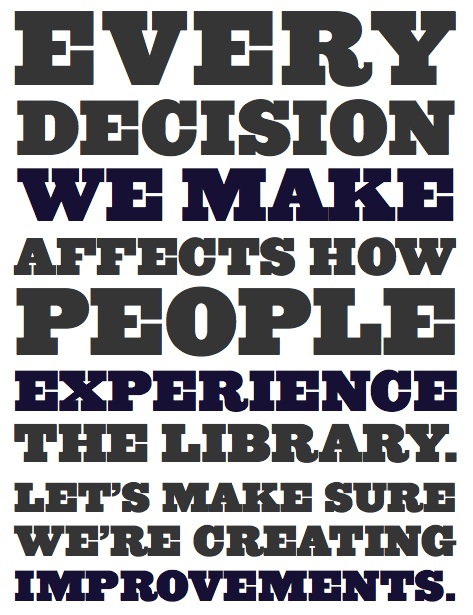Short attractive website telling us some things to keep in mind. The Usable Library. Thanks for the CC attribution on the poster!
Tag: walkingpaper
on defaults, and design
Aaron Schmidt has a column in Library Journal about user experience. Here is his first column. The ideas of design and user experience seem sometimes orthogonal to what we do in libraries. We are concerned with content not containers, you know “judging a book by its cover” and all that. Aaron explains why design matters and how it pervades many aspects of what we do. Sarah got the best pullquote out of it already
Every time librarians create a bookmark, decide to house a collection in a new spot, or figure out how a new service might work, they’re making design decisions. This is what I like to call design by neglect or unintentional design. Whether library employees wear name tags is a design decision. The length of loan periods and whether or not you charge fines is a design decision. Anytime you choose how people will interact with your library, you’re making a design decision. All of these decisions add up to create an experience, good or bad, for your patrons.
This comes up in my technology-instruction world quite often. Many things about how a user interacts with a computer are pre-determined or at least have a default setting. So the talking paperclip? Someone made a choice that you would see that, instead of having it be a turn-onable option. The “your computer may be at risk!” messages? You can turn them off but the default is ON. These are all choices, actively or passively made. My feeling is that the more we explain to people that they can re-make some of these choices [get the talking dog away from the search box!] it empowers them to envision their computing experience the way they might want it to be, to know they have choices.
DC Public Library catalog accessible via iPhone app
Aaron posts about an alternative catalog interface that DC Public Library has created for the iPhone and iPod touch. Nice looking, and with the code “available soon” hopefully replicable by other libraries using SirsiDynix. Go download it and test it out.
aaron’s job, let me show you it….
Aaron Schmidt got a new cool job: Digital Initiatives Librarian for the District of Columbia Public Library. Sounds big and exciting. DC is really trying hard to dig themselves out of years of bad management and terrible funding crisises, it will be interesting to see if new people plus some infusion of new money can help with this. Congrats Aaron.
HOWTO give a good presentation
Aaron has a good post about giving good presentations. As always, stick around for the comments. I offered my advice. Even in the short thread, it’s interesting that people have such different ideas about what makes a good presentation. Should it be something that can be repackaged and replayed without the presenter at a later date? Should there be handouts? What’s the balance between charisma and raw data?
